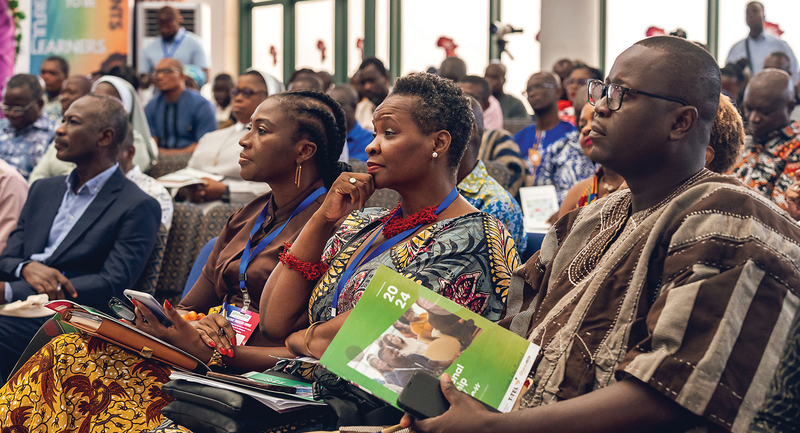She calls it her "assignment on earth" to pull as many kids out of poverty as possible. The first female assistant superintendent of high schools in the School District of Philadelphia, Linda Cliatt-Wayman stepped down from her role in central office to become principal of Strawberry Mansion in 2012. The inner-city high school—notorious for its drugs, gangs, and extreme violence—had been on Pennsylvania's "persistently dangerous" list for five consecutive years.
Having grown up in North Philadelphia just a few blocks away, Wayman took on the "life-saving work" of righting the injustices experienced by students in poverty. Her relentless leadership helped turn around Strawberry Mansion, raising performance and taking it off the dangerous schools list after just one year.
Wayman now runs a nonprofit to help the city's poorest students make it through high school. She is author of Lead Fearlessly, Love Hard: Finding Your Purpose and Putting It to Work, and her TED Talk on how to fix a broken school has been viewed nearly 2 million times. In the following interview, she shares what every teacher and school leader should know about educating children in poverty.
In your book, you describe how, when you first came to Strawberry Mansion, the Department of Justice held a nonviolence assembly in the school auditorium. The presenters played a video reenactment of the Columbine shooting, and your students erupted into laughter. What effect did that have on you?
At first, I sat there in amazement. I'm looking around and I'm saying to myself, What in the world is going on? I really didn't understand it at all. I thought they were being disrespectful and rude. I let the program continue, but when it was over I brought some kids to a roundtable conversation.
When they told me, "That's nothing compared to what we see on the streets each night," right then, my heart sank. And I said to myself, Oh my god. They can't even relate to the pain of other people because they're so wounded. And that changed a lot for me. I actually looked at the entire thing different. That all of the violence, all of the disrespect, all of the walking the halls, all of the assaults—it all came because they were in this deep state of hopelessness.
It was their reaction to that film that made me say, OK, yes, they need rules. They need consequences. But they need some fun and a whole lot of love. It was the only way for me to turn the school around.
Speaking of love, you ended your morning and afternoon announcements by saying, "If nobody told you they loved you today, remember I do, and I always will." Why was that message so important to communicate?
The teachers brought a young girl to me one day who was being very, very rude in class. And the young girl just told me, "Stop talking to me, Ms. Wayman. Will you please stop talking to me because nobody loves me. Nobody on this earth loves me." And I just sat back in my chair, and I couldn't believe that she thought nobody on this earth cared about her. And so, I got on the loudspeaker and I told them, "Look, guys, if nobody says they love you, I love you." It started there.
When I got to Strawberry Mansion, it was something I always said to my students. Strawberry Mansion was 50 times worse than my previous school, and they needed to hear it even more. My kids—13, 15, 16, 17, 18 years old—would tell me, "Ms. Wayman, nobody has ever told me they loved me." And so, it was important for me to let those students know that you are not walking around this world unloved. I'm here for you every day, the staff is here for you every day, and we absolutely love you. And we're going to show you that we love you in these ways: we're going to have high expectations for you, we're going to make sure you have the best teacher in the classroom possible, and we're going to make sure school is fun. It was something that they latched on to. They needed to hear that they were loved.
What advice do you have for teaching students in poverty, especially for teachers who have never personally experienced poverty?
I had a lot of teachers in that situation. The one thing that I would tell them is to never get it in your mind that you have to use what you see as some type of pity party for not teaching. I would always tell my teachers, "You are a teacher. No, you may not understand a lot about what their home lives are like, but you know about teaching, so I need you to go into the room, build relationships with the children, and teach to the highest level possible and expect for those kids to reach it. Because if you do that, they will."
My one teacher, Ms. Speirs, grew up in Florida and knew nothing about poverty, but she referred to her students as scholars. "You're scholars, all of you." The kids didn't even know what that meant. They said, "What is that?" So in her mind, she was already thinking, I may not know your individual situation now, but I know where you can go in the future. I see you as a doctor; I see you as a lawyer. And if I see you as that, it starts right here today, and being a scholar means making sure that essay gets done. And I'm going to show you how.
So my advice to inner-city teachers that have never dealt with this situation is to do your job and teach. Do not fall into this trap of, "But you know, they just can't do it. They're poor, they don't have this at home, they don't have that at home. I'm not going to give that assignment because many of them just can't do it." They can do everything everybody else can do if you expect it and teach it. So, I would always tell my teachers, "I need you to do one thing: teach." They said, "Ms. Wayman, why do you keep saying that?" "They need a teacher, babe. They're not worried about whether you were in poverty; they need a teacher."
Before I got to Strawberry Mansion, they were giving the kids 3rd grade books. Why are you giving the kids 3rd grade books, and they're in the 10th grade? "Well, I don't know if they're going to read it. That book got too many pages in it." So you gotta have expectations and you gotta just teach. Teach to the best of your ability and don't get so consumed by their situation. Nurture them through this situation, but the best thing you can do is see them in the future. If I can just teach them how to write this essay, I can get them here. If I can just teach them how to do these math problems, I can see them in this college. And they will rise to every expectation. It is absolutely amazing what they can do. But they're often not given the opportunity.
You put relationships at the center of everything, from teaching and learning to school safety. What does that look like in practice for a school leader?
Constantly talk to students and listen to what they have to say—and act on that. At Strawberry Mansion and in my other schools, we gave them a forum to talk. But there was never a day that I did not walk through my halls, almost every period, and say, "Hi Johnny, how you doing? I heard last week your grandmother was sick. Is your grandmother well today?" I always tried to find out a little piece of information in their daily lives that would get me to that bridge to say something to them. Or I would say, "Oh, your teacher told me you got an A on that test today. Great job!" I constantly made it my business to know something about them that would give them a reason to want to continue to talk to me. Then, when they would talk to me or ask questions, I would clearly listen to what they had to say and always follow up.
You walk through schools now, and there are kids who will tell you they don't even know their principal's name. They don't even know their name. The principal is at the top—and everybody in that building is watching what the principal does—so the principal has to build relationships, even if it's just through a daily announcement. "Hi, guys, good morning. You all look beautiful this morning, glad to see you." You have to say something to them. It's the only reason why they would continue to want to talk to you, if you get to know them as people.
And once you get to know them as people, if they're doing something wrong, you already have a relationship with them. I could walk up to someone and say, "Now Johnny, why did you just throw that on the ground?" "Oh, Ms. Wayman, I'm so sorry. That is a rule, that we keep our school clean, right?" "Yes, babe, pick the paper up." When I first walked into Strawberry Mansion, they would tell me how many ways I could "go F myself"—because that's what happened—"F you, I'm not picking up nothing. Who the H are you?" And I'm talking about hardcore situations. Schools in Baltimore, Chicago, and Los Angeles are dealing with the same type of situation I was dealing with in Philadelphia.
You have to seek out a way to personally relate to students for them to understand that you have their best interests at heart and you want them to be educated. And I would tell them that every single morning and every single afternoon: how I expect for them to get a high school diploma, how I expect for them to behave themselves, and how I expect for them to abide by the rules. It all came from me. Now, did my entire team support that work? Absolutely. We all fit together like a puzzle.
Your book shifts the focus from the challenges of educating children in poverty to what it takes to succeed in a broken system. What does an urban principal need to do to "lead fearlessly [and] love hard"?
A lot of times in high-poverty areas, school leaders believe they can lead just sitting in their office, and they have a whole bunch of APs [assistant principals] and different people running the school. It never works. It has to be a system where everybody is on the same page. Sometimes school leaders like to delegate a lot of things …, but I've never seen that work in a high-poverty, high-violence school.
Like I always say, "If you're going to lead, then lead." You cannot delegate your work away. You have to be part of the system. You have to let everybody see you're working as hard as everybody else, and you all work together. My teachers, my god, they were beat down. They had the burden of being in those classrooms with those kids every single period. And they were very challenging children. So the one thing I had to do as a school leader was make them realize I was their main support. It's me. Whatever you're doing, whatever you need support with, you come see me, and I'm going to be the person who gets that support for you, no matter what it is.
A lot of school leaders in high-poverty areas will say, "Well, that's on you. That's your room, you figure it out." It can't go like that. Teachers need help. And they have to look at their school leader as a support for them in every area of the classroom.
Any final words of advice?
In inner-city, high-poverty, high-crime areas, the principalship is different. We cannot lead like everybody else. We have to be really personal with the kids. We have to be honest with the kids. We have to say what we mean and do what we say. And we have to expect for those kids to make it from their circumstance. If we don't believe it in our heart, that we can make a difference and change these kids' lives, then we're in the wrong seat.
Editor's note: This interview has been edited for length and clarity.








